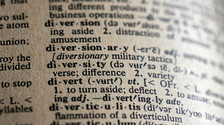azahrah.qolbaina
what the things that make verb 2 and verb 3 different
I was confised by verb 2 and verb 3. Can you explain it?
Mar 16, 2012 11:16 AM
Answers · 3
What is verb 1?
March 16, 2012
It sounds like you're asking about patterns like "see - saw - seen", or (Brad's example) "go - went - gone".
Basically, the past participle ("verb 3") always needs a helping verb. Always. It can't function without one. So you can say "I have seen" or "it is gone", but "it gone" and "I seen" are completely wrong; you need "it went" and "I saw" (simple past) in these cases.
You use the past participle in perfect tenses (I have seen; I had eaten; I will have spoken), hypothetical forms using "have" (I should have known; it could have sunk), or passive forms (it is known; that was eaten).
Verb 2 (past simple) is the basic past tense of the verb.
March 16, 2012
Are you talking about the simple past (e.g., "went") vs. the past participle (e.g., "gone")?
March 16, 2012
Still haven’t found your answers?
Write down your questions and let the native speakers help you!
azahrah.qolbaina
Language Skills
Arabic, English, Indonesian, Turkish
Learning Language
Arabic, English, Turkish
Articles You May Also Like

Top 6 Mistakes to Avoid with Vocabulary Acquisition
38 likes · 10 Comments

Navigating Your First Job: Do's and Don'ts in the Workplace
47 likes · 21 Comments

What Content to Watch to Acquire Advanced-level Proficiency
79 likes · 50 Comments
More articles
